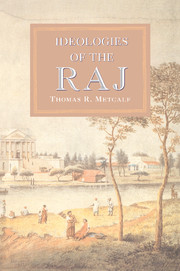Bibliographical essay
Published online by Cambridge University Press: 28 March 2008
Summary
general studies
A variety of works assess British attitudes toward India, and the ways India was fitted into the larger set of ideas that sustained the Raj. Some of these works are idiosyncratic, even contentious in their approach, but all are lively and suggestive. Francis Hutchins, The Illusion of Permanence: British Imperialism in India (Princeton, 1967), though now somewhat dated, remains a stimulating account of how the British sought to assure their superiority over their Indian subjects. More philosophical, with a discussion of German as well as British scholarship, though tendentious in its argument, is Ronald Inden, Imagining India (Basil Blackwell, Oxford, 1990). Two stimulating works from a psychological perspective, the latter of which includes Indian as well as British responses to the colonial encounter, are Lewis Wurgaft, The Imperial Imagination: Magic and Myth in Kipling’s India (Wesleyan University Press, Middletown, CT, 1983), and Ashis Nandy, The Intimate Enemy: Loss and Recovery of Self Under Colonialism (Oxford University Press, Delhi, 1983). Kipling’s own writings of course, especially the enduringly powerful Kim (1901), are central to any understanding of the Raj.
Among a number of works based largely on the critical evaluation of literary texts the most informative are Sara Suleri, The Rhetoric of English India (Chicago, 1992) and Benita Parry, Delusions and Discoveries: Studies on India in the British Imagination 1880-1930 (California, 1972). Though less accessible to the general reader, the writings of the literary critics Gayatri Spivak and Homi Bhabha contain much that is important for understanding the Raj. Specially useful are the essays in Francis Barker et al., eds., Europe and its Others, vol. 1 (University of Essex, Colchester, 1985). Of more general interest are the special number on race of Critical Inquiry, vol. 12 (autumn 1985), and Patrick Brantlinger, Rule of Darkness: British Literature and Imperialism, 1830-1914 (Ithaca NY, 1988). Though it does not include India in its account, Edward Said’s Orientalism (London, 1978) has shaped all subsequent discussion of the ideas that informed European views of the ’Orient’.
- Type
- Chapter
- Information
- Ideologies of the Raj , pp. 235 - 240Publisher: Cambridge University PressPrint publication year: 1995

